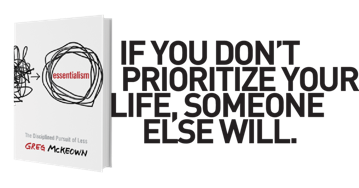 This spring I (finally) read the book Essentialism by Greg McKeown and it has captured my attention and dominated my thought process throughout the summer. The content aligns beautifully with the awareness and reality that virtually everything we think or do is a choice we make. What’s important to you? How are you investing / spending your time? The objective is to strengthen the process of saying “no” to the “trivial many” so you and I can focus more on the “essential few.”
This spring I (finally) read the book Essentialism by Greg McKeown and it has captured my attention and dominated my thought process throughout the summer. The content aligns beautifully with the awareness and reality that virtually everything we think or do is a choice we make. What’s important to you? How are you investing / spending your time? The objective is to strengthen the process of saying “no” to the “trivial many” so you and I can focus more on the “essential few.”
“If you don’t prioritize your life, someone else will”
The way of the “Essentialist” means living by design, not by default. Instead of making choices reactively, the Essentialist deliberately distinguishes the vital few from the trivial many, eliminates the nonessentials, and then removes obstacles so the essential things have clear, smooth passage. In other words, Essentialism is a disciplined, systematic approach for determining where our highest point of contribution lies, then making execution of those things almost effortless.
The book points out three deeply entrenched assumptions we must conquer to live the way of the Essentialist: “I have to,” “It’s all important,” and “I can do both.” To embrace the essence of Essentialism requires we replace these false assumptions with three core truths: “I choose to,” “Only a few things really matter,” and “I can do anything but not everything.” These simple truths free us to pursue what really matters. Can I get an Amen!
As I mentioned, the power contained in our ability to choose comes through loud and clear. A heightened awareness of our responsibility is a must to become an Essentialist. When we forget our ability to choose, we learn to be helpless. The Essentialist knows that when we surrender our right to choose, we give others not just the power but also the explicit permission to choose for us. Not cool!
One of the profound takeaways for me was about discernment and “the unimportance of practically everything.” The Essentialist takes the time to explore all options to uncover what matters most in their life and vocation. An Essentialist discerns more so one can do less.
Finally, Essentialists see trade-offs as an inherent part of life, not as an inherently negative part of life. Instead of asking, “What do I have to give up?” they ask, “What do I want to go big on?” Trade-offs or choices are not something to be ignored or dismissed. They are something to be embraced and made intentionally, strategically, and thoughtfully. As a result, we discover and live a life unfettered of “what’s possible” not just “what’s probable.”
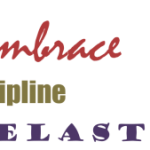
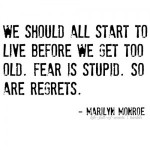

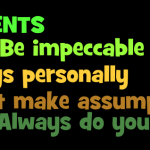
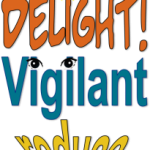





Comments on this entry are closed.